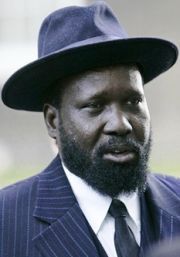Sudan First Vice President says Abyei report ‘binding’ to ruling party
February 13, 2008 (CAIRO) — Sudan’s First Vice President and president of South Sudan Salva Kiir complained to the Egyptian president Hosni Mubarak about the lack of implementation of the Comprehensive Peace Agreement (CPA) by the ruling National Congress Party (NCP).

Sudan’s First Vice President was on a two day visit to Cairo Cairo that focused on the Egyptian role in the reconstruction projects.
The Southern leader told the semi-governmental Al-Ahram daily that the NCP is the party blocking the implementation of the Abyei protocol which is part of the Naivasha agreement that ended two decades of the civil war between the North and the South.
Under the protocol a commission known as the Abyei Boundaries Commission (ABC) was to “define and demarcate the area of the nine Ngok Dinka Chiefdoms transferred to Kordofan in 1905, referred to herein as Abyei Area”.
However the president Omar Hassan Al-Bashir said that the NCP is committed to the Abyei Protocol only with the border of 1905. He further said the government is not concerned with the ABC report and that the latter is of no value to them.
“The ABC report should be binding to all parties but the NCP rejected it and is looking for an alternative. This is not acceptable to us and we will stick the report” Kiir said.
The remarks by Kiir could signal further tensions between the peace partners over the oil rich region. Both sides in the past have laid down proposals to break the deadlock on the issue including international arbitration.
However Kiir closed the door in front of any attempts for third party intervention on the matter.
“Everything that we agreed on within the CPA should be implemented because if we agree to a renegotiation this will open the door for a more revisions to the peace accord which will send us back to square one” he added.
The Abyei region has been described as Sudan’s Kashmir by the ENOUGH project saying that it may develop into a “national war with regional implications and historically devastating repercussions”.
There was an outbreak of fighting between Sudan People Liberation Army (SPLA) and the nomadic Misseriya tribe, who go to Abyei for cattle-herding, in November and December of last year which claimed dozens of lives.
Both sides accuse each other of initiating the violence. Recently members of the Misseriya tribe closed the route leading to Abyei.
Sudan First Vice President accused the NCP of arming the Misseriya tribesmen to fight the SPLA.
“Where did the Misseriya’s get all these trucks loaded with heavy weapons? This is not basic tribal arms. They are in possession of heavy artillery. Where did they get this from? Some of those who died in the December and January fighting were Sudanese army officers and we even have their military ID’s” Kiir said.
“We hold the NCP responsible for all this escalation that may lead to the renewal of war’ he added.
Kiir accused certain figures within the NCP of orchestrating the clashes in Abyei but declined to name them.
“This is a Dinka region and the Misseriya’s had the right to use the area for cattle grazing. Our ancestors did not revoke that right and they lived peacefully with them. What is happening now from the Misseriya such as blocking the road to Abyei is not their own position; there are senior politicians pushing them to fight the Dinka’s who were the main supporters of SPLA during the civil war” he added.
On Darfur the SPLM chairman said that his movement does not favor a specific leader in response to a question that they are backing Ahmed Abdel-Shafi the head a Sudan Liberation Movement (SLM) faction.
Kiir said that the Justice and Equality Movement (JEM) have an agenda “similar to those who want to implement Shari’a Islamic law in Sudan”. He also said that other Darfur rebel movements have different views from JEM and that they are trying to bring them closer together.
“We disagreed with the NCP on the actions they are taking in Darfur and we rejected the military solution because we know the problem it creates and we have tried in the South before and it didn’t work till we were able to achieve peace” he said.
On the economic front Kiir acknowledged to Al-Ahram that corruption is a persistent issue in the South but denied that it is behind the lack of development.
“The South is dependent on the oil revenues with no other resources. Most of the money is spent on basic services and government civil servants. The leftovers are very small and we can’t use it for development” he stressed.
“When we came to power we discovered that the Southern State Coordination Committee in charge of the south before us was spending money on nothing. In the payroll file we found non-existent names as well as their wives and children. Those corrupt people who were in charge are the same ones who accuse us today of corruption” Kiir said.
The Southern leader said that anyone who has evidence that late John Garang was assassinated should come forward to appropriate authorities, otherwise they “should not throw baseless accusations against the government of Southern Sudan or to the NCP” he said.
The SPLM signed a peace deal in January 2005 with the government of the National Congress Party in January 2005 ending two decades of civil war in Southern Sudan. The peace deal made the SPLM, the ruling party in the south and the NCP the ruling party in the north.
In 2011, southerners will be asked to vote in a referendum on whether they want to be independent or remain part of Sudan.
(ST)
